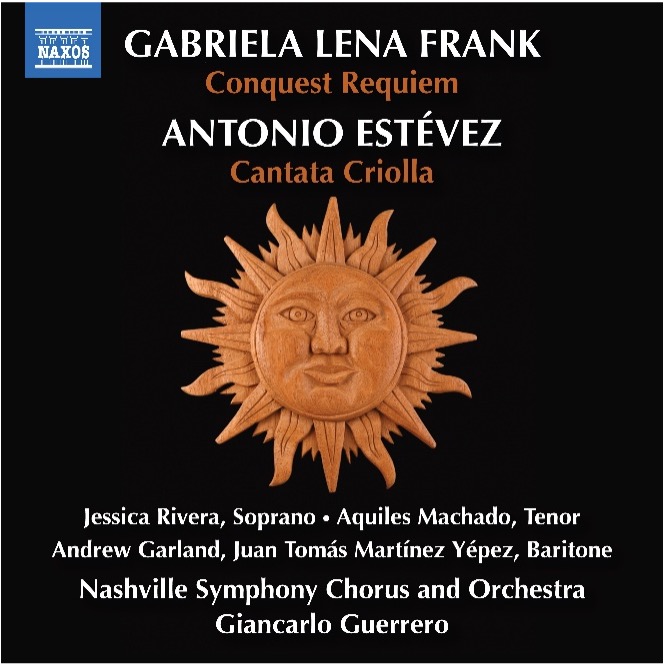Nashville Symphony to release “Conquest Requiem” on November 14

Gabriela Lena Frank: Conquest Requiem
Antonio Estévez: Cantata Criolla
Nashville Symphony
Giancarlo Guerrero, conductor
Nashville Symphony Chorus
Tucker Biddlecombe, chorus master
Jessica Rivera, soprano
Aquiles Machado, tenor
Juan Tomás Martínez Yépez & Andrew Garland, baritones
Daniel Binelli, bandoneon
Alcides Rodriguez, maracas
November 14, 2025 (Naxos American Classics)
NASHVILLE, TN – November 10, 2025 – On November 14, The Nashville Symphony, under the direction of Giancarlo Guerrero adds to its extensive discography on Naxos American Classics with the world premiere recording of Gabriela Lena Frank’s Conquest Requiem and a new recording of Venezuelan composer Antonio Estévez’s Cantata Criolla.
Recorded live in November 2022 at the Nashville Symphony’s Schermerhorn Symphony Center, Conquest Requiem offers a poignant reflection on Spain’s conquest of the Aztec Empire inspired by the true story of Malinche, the young Nahua woman who played a key role in shaping the history of Western civilization. Frank’s ambitious work brings to life the complexities of colonization, identity and survival through a fusion of Western liturgical traditions, indigenous Nahua poetry and Latin influences.
Gabriela Frank explains, “This piece is inspired by the true story of Malinche, a Nahua woman from the Gulf Coast of Mexico who was given to the Spaniards as a young slave. Malinche’s ever-evolving prowess as an interpreter of her native Nahuatl, various Mayan dialects, and Spanish elevated her position such that she would convert to Christianity and become mistress to Cortés during his war against the Aztecs…While Malinche has been conflated with Aztec legends, she has been variously viewed as feminist hero who saved countless lives, treacherous villain who facilitated genocide, conflicted victim of forces beyond her control, or as symbolic mother of the new mestizo people.
In Conquest Requiem, Malinche’s story is the linchpin for the juxtaposition of traditional liturgical verses from the Latin Mass for the Dead against Nahua poetry as chronicled from the mouths of fallen indigenous princes (notably Nezahualcoyotl). Newly composed Spanish words from playwright and poet Nilo Cruz round out the text.”
Antonio Estévez’s Cantata Criolla – subtitled Florentino, who sang with the Devil – sets a text that was initially published in 1940 by the Caracas-based folklorist, poet and diplomat Alberto Arvelo Torrealba (1905–1971). Thomas May writes in his liner notes that Torrealba’s poem, itself, is a “Venezuelan cultural icon that has been frequently adapted to various media.” The story centers around the llaneros – Argentinian cowboys – and their “practice of poetic duels (contrapunteos), in which the participants (copleros) would combat with words rather than weapons.” The llanero Florentino here meets his match when he proposes such a duel with a mysterious horseman who turns out to be the Devil.
Estévez’s Cantata Criolla has been a wildly popular work in Venezuela since its premiere in 1954, after which it won the Ministry of Culture’s National Music Award and was established as a favorite among Venezuelan youth orchestras and choruses. Nashville Symphony Music Director Emeritus Giancarlo Guerrero learned the work early in his career in Venezuela, where he earned his first conducting appointment with the young musicians in El Sistema. “We normally think of choral music as church music, particularly in connection with Europe,” says Guerrero. But Cantata Criolla, which Antonio Estévez wrote for the secular concert hall, counts as “one of the greatest 20th century Latin American choral pieces.”
Tracklist:
Gabriela Lena Frank (b. 1972)
Conquest Requiem (2017)
Text: Latin Mass for the Dead 1–7, Nilo Cruz (b. 1960) 1, 3, 5, 7,
attrib. Nezahualcoyotl (b. 1402), trans. Gabriela Lena Frank 1, 3, 7
1 I. Introit: Cuicatl de Malinche (‘Song of Malinche’)
2 II. Judex ergo cum sedebit –
3 III. Dies Irae: Cuicatl de Martín (‘Song of Martín’)
4 IV. Recordare, Jesu pie –
5 V. Rex Tremendae: El aullido de Malinche (‘The Howl of Malinche’)
6 VI. Confutatis maledictis –
7 VII. In Paradisum: Benedicion de Malinche y Martín
Antonio Estévez (1916–1988)
Cantata Criolla ‘Florentino, et que cantó con el Diablo’
(‘Florentino, who sang with the Devil’) (1947–54)
Text: Alberto Arvelo Torrealba (1905–1971)
8 Part I – El Reto (‘The Challenge’): Lento e cadencioso
9 Part II – La Porfia (‘The Duel’): Lento, tenebroso – Allegro vivo
Jessica Rivera, Soprano
Aquiles Machado (as Florentino), Tenor
Andrew Garland, Baritone
Juan Tomás Martínez Yépez (as El Diablo)
Daniel Binelli, Bandoneon
Alcides Rodriguez, Maracas
Nashville Symphony Chorus
Tucker Biddlecombe, Chorus Master
Nashville Symphony
Giancarlo Guerrero
About Giancarlo Guerrero
Giancarlo Guerrero is a six-time GRAMMY® Award-winning conductor whose imaginative programming and “curatorial and interpretive creativity” (Chicago Tribune) draw out of his orchestras “exceptionally powerful and enchanting performances” (BBC Music Magazine). 2025 marks Guerrero’s first season as Artistic Director and Principal Conductor of the Grant Park Music Festival in Chicago. Guerrero also takes on the role of Music Director of Sarasota Orchestra in the 2025-26 season.
Guerrero is currently Music Director Laureate with the Nashville Symphony, following sixteen years as Music Director. During his tenure in Nashville, he championed the works of prominent American composers through commissions, recordings, and world premieres. Under Guerrero’s direction, the Nashville Symphony released twenty-one commercial recordings, which have garnered thirteen GRAMMY® nominations and six GRAMMY® Awards.
In recent seasons, Guerrero has led prominent North American orchestras including the New York Philharmonic, Los Angeles Philharmonic, Philadelphia Orchestra, Cleveland Orchestra and the San Francisco, Boston, Baltimore, Chicago, Cleveland, Dallas and Detroit Symphonies. Internationally, he has worked with orchestras in Bilbao, Frankfurt, London, Paris, São Paulo and Sydney.
Guerrero previously held posts as Music Director of the NFM Wrocław Philharmonic, Principal Guest Conductor of both The Cleveland Orchestra, Miami Residency and the Gulbenkian Symphony in Lisbon, Music Director of the Eugene Symphony, and Associate Conductor of the Minnesota Orchestra.
Born in Nicaragua, Guerrero immigrated during his childhood to Costa Rica, where he joined the local youth symphony. He studied percussion and conducting at Baylor University and earned his master’s degree in conducting at Northwestern. Guerrero is particularly engaged with conducting training orchestras and has worked with the Curtis School of Music, Colburn School in Los Angeles, The Juilliard School, National Youth Orchestra (NYO2) and Yale Philharmonia. More at www.giancarlo-guerrero.com.
About Nashville Symphony
Founded in 1946, the Nashville Symphony is integral to Music City’s vibrant musical landscape. Led by music director Giancarlo Guerrero and president and CEO Alan D. Valentine, the 83-member orchestra performs more than 130 concerts annually, with a strong commitment to contemporary American orchestral music. Recognised for championing new works, the Nashville Symphony has collaborated with leading composers such as Jennifer Higdon, Terry Riley, Joan Tower, Aaron Jay Kernis, Michael Daugherty, John Harbison, Julia Wolfe and Hannibal Lokumbe. The orchestra is also known for its commissioning and recording projects with Nashville-based artists, including Edgar Meyer, Béla Fleck, Ben Folds, Victor Wooten and Kip Winger. One of the most active recording orchestras in the US, the Nashville Symphony has released over 40 recordings, earning 27 GRAMMY nominations and winning 14 GRAMMY Awards, including two for Best Orchestral Performance. Schermerhorn Symphony Center is home to the Nashville Symphony and widely regarded as one of the finest concert halls in the nation. www.nashvillesymphony.org



